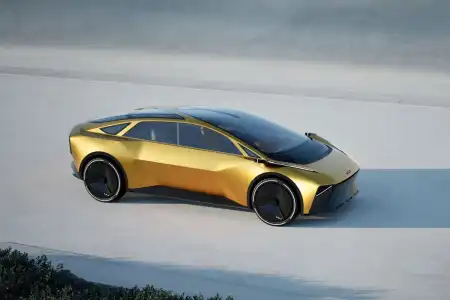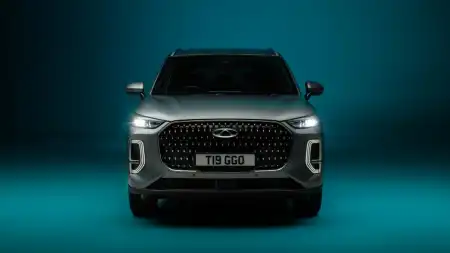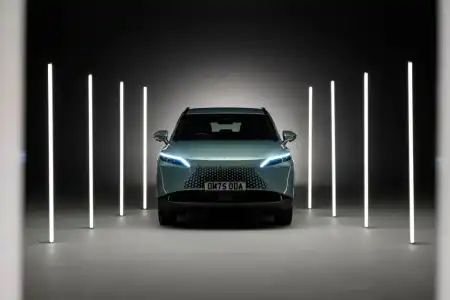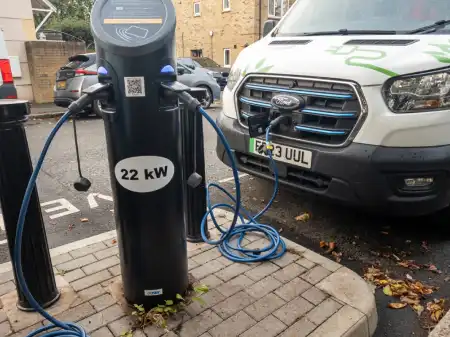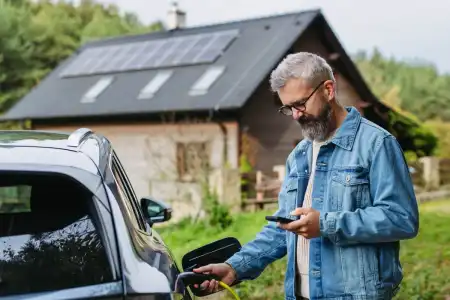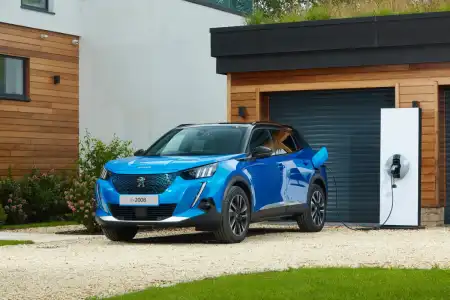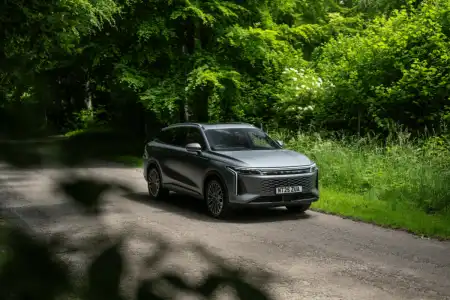Welcome to Regit's

Your trusted resource for all things electric – from expert buying guides to essential tools that make owning an Electric Vehicle simple and stress-free.
Empowering Your Electric Journey with Regit’s Electric Hub
At Regit, we believe transitioning to electric should be simple, informative, and tailored to your needs. Our Electric Hub is here to guide you every step of the way—whether you’re exploring your first electric vehicle, comparing models, or looking for ways to save on ownership costs. From practical tools to expert advice, we’re committed to helping you make confident, informed choices that fit your lifestyle and budget.
Our Tools
Fuel Saver
Calculate potential savings with an electric vehicle.
Electric Vehicle Matchmaker
Find the perfect Electric Vehicle for your budget and lifestyle
Key Considerations When Buying an Electric Vehicle
Switching to electric is an exciting choice, but finding the right Electric Vehicle involves considering several key factors. Here’s a quick guide to help you make the best decision for your lifestyle, budget, and driving needs.
Battery Range
Consider your daily driving distance and how often you need to charge. Ranges vary widely from 100 to over 300 miles per charge, so choose a model that fits your lifestyle
Charging Options
Home, public, or rapid charging? Each has different costs and speeds. Make sure you have convenient access to charging that supports your travel habits and energy needs.
Cost of Ownership
Beyond the upfront price, EVs have lower running costs due to fuel savings, tax benefits, and less maintenance. Calculate total costs to see the long-term savings.
Vehicle Size and Type
From compact hatchbacks to spacious SUVs, there’s an EV for every need. Think about passenger space, cargo capacity, and body style that best suits your lifestyle.
Fuel Saver
See Your Savings in Real-Time
Enter your annual mileage, and we’ll show you how much you could save with an EV.
Stay Updated with the Latest in Electric Vehicles
Explore the latest news, trends, and insights from the world of electric vehicles. From groundbreaking technology and new model launches to government incentives and environmental impacts, our news section keeps you informed on all things Electric Vehicle.
Important Update for EV Owners!
Starting April 2025, all electric vehicles will be subject to road tax (VED) for the first time.
Starting in April 2025, the government is introducing new road tax (VED) rules for electric vehicles. This change means that even zero-emission cars, vans, and motorcycles will soon have an annual tax. Here’s what you need to know to stay prepared:
New EVs
Taxed from day one, with the lowest rate for zero emissions.
Annual Charge
After the first year, EVs will move to a flat yearly rate.
High-Value EVs:
Vehicles over £40,000 face an extra annual charge in years 2 to 6
Existing EVs
Even current EVs will start paying a standard rate from 2025.
Make sure you’re prepared!
Check Your Car Tax Status NowEV Charging Stations & Journey Planner
Find charging points and plan your electric vehicle journeys across the UK
Electric Vehicle Knowledge Hub
Whether you’re new to electric vehicles or a seasoned Electric Vehicle driver, our Knowledge Hub is packed with expert insights, guides, and answers to common questions.
What is the workplace charging scheme for electric cars?
The Workplace Charging Scheme helps UK businesses install EV chargers, cut costs, and support employees with workplace charging
Electric‑car charging etiquette - the do’s and don’ts of EV charging
Learn the essential dos and don’ts of electric car charging, including public and workplace etiquette, planning tips, and how to avoid...
What could a pay-per-mile car tax mean for you?
UK drivers may soon face a pay-per-mile road tax, with heavier electric cars paying more. The proposal aims to replace falling fuel duty...
Why Choose an Electric Vehicle?
Electric cars are here to stay - with more models, better charging, and government targets, now’s the time to ask: why go electric?
Driving the Future: Key Electric Vehicle Facts & Figures
1.3m
1.3 million fully electric cars on the road, making up about 3.83% of all vehicles.
64K
64,632 public electric vehicle charging devices, marking a 47% increase from previous year.
35%
The UK Government offers grants covering up to 35% of the purchase price for eligible vans, motorcycles and mopeds.
80%
You an now charge an Electric Vehicle battery to 80% in as little as 30 minutes.
Discover Your Next Electric Vehicle
Browse Our Selection of Top Electric Vehicle’s for Sale
Volkswagen Id.3
Range: 214 - 340 miles
Home Charge: 7.5 - 39 hours
Quick Charge: 0.5 - 12.7 hours
What It's Really Like to Own an Electric Car
Curious about making the switch but worried about common EV myths? Our Electric Vehicle Myth Buster is here to set the record straight. Discover the truth about owning an electric car with seven key insights that debunk common misconceptions, reduce fears, and show you how easy and enjoyable Electric Vehicle ownership can be. Swipe through to learn what it’s really like to drive electric!
1.
Lowering your carbon footprint
Owning an electric car isn’t just about driving - it’s about making a smart and sustainable contribution to the planet.
Frequently asked questions
The world of electric motoring can be intimidating, but we're here to walk you through it. Don't worry, it's not as complicated as you may have been lead to believe, in fact, it's rather simple. Here are the most commonly asked questions answered for you...
Yes, you can Offset your carbon emissions online today for peace of mind using our Carbon Offset Calculator.
The cost of charging an EV varies based on the size of the battery and the rates provided by the electricity provider.
On average, domestic electricity providers will charge 14p per kWh. So if you have a 60kWh battery, a full charge from empty will cost £8.40. The price of electricity decreases at night as demand decreases, so you can expect the price of a full charge to drop during off-peak hours.
The cost of electricity at domestic charging points will not change significantly irrespective of whether you use a fitted wall-box or a 3-point plug socket.
Public charging stations vary in price also but to give you an idea, a BP Pulse subscription (£7.85 per month) will give you access to Britain's largest network of chargers, some of which are free to use and some will charge a tariff rate of 12p per kWh.
Almost all production electric cars are automatic, meaning they don't have a clutch, gear stick or gearbox. Typically, these cars will use a simple button or switch to shift between park, drive and reverse.
One of the main differences between driving a "green car" compared to a petrol or diesel car is that when you accelerate the torque is instant and linear, without the need for acceleration to be interrupted by gear changes.
Petrol or diesel cars are most effective within certain rev ranges, and it is ideal for efficiency and acceleration to keep the car within those ranges to ensure a smooth driving experience. Electric cars, however, have 100% of the power available 100% of the time, so there is no need for a gearbox.
Yes, there are a number of ways you can charge an EV at home. A standard 3 pin plug socket is all that is needed to charge an electric car, although this is the slowest possible way of recharging your battery.
A domestic 'wall box' is a separate charging point that can be wired into your home's electricity supply. These are typically installed by the supplier and can allow charging up to 7.4 kW. The charging points can halve the time required to recharge your car when compared to a 3-pin plug, which typically charges at 2.3 kW
Electric cars are most commonly charged at the owners home address or at their workplace. There is a growing network of tens of thousands of public charging points in supermarkets, car parks and petrol stations too.
There are countless apps provided by charging point providers, such as BP Pulse, which can direct you toward the charging points nearest to your home address, your workplace or along the route of your journey.
Around 40% of public charging points are free to use in the UK, however, the charging points along the motorway network will typically charge around 14p per kWh.
The London Congestion Charge was introduced to reduce the number of polluting cars on inner-city streets while also encouraging sustainably-powered car adoption.
Previously, only cars that emit less than 100 grams of CO2 per kilometre were exempt, but as car technology improved and the number of qualifying cars increased, the threshold was reduced to 70 grams per kilometre of CO2.
Right now, all fully electric cars are exempt from the London Congestion Charge until December 2025. Plug-in hybrid cars which emit less than 70g/km of CO2 are also exempt however that is only until October 2021, when the restrictions are set to become tighter.
Once an electric car is three years old it will need to have an MOT test, just like every other petrol or diesel car. The only difference is that there are no emissions or noise tests included when an electric car is MOT'd.
The total maximum range of such a car varies by make, model and battery size, as well as the manner in which the car is being driven and the outside environment. Manufacturers test their car to the World Harmonised Light Vehicle Test Procedure - or WLTP - so this is the standardised measurement buyers should use when deciding which car to buy.
You would expect an entry-level modern EV to travel at least 150 miles on a full charge, with some small hatchbacks now achieving up to 250 miles on one charge.
In 2020, the Renault ZOE was the best selling electric car in Europe, which can return up to 245 miles of range on a full battery when driven to WLTP standards.
One of the most underrated benefits of owning a "green car" is the savings made through ownership. The owner will save a large amount in fuel, but electric cars have fewer moving parts in their motor when compared to an engine.
Electric cars don't need their oil, spark plugs, fuel filters or drive belts replaced at regular intervals, which drastically reduces the maintenance costs. Brake pads will still need to be looked after, but most electric cars use regenerative braking. Regenerative braking increases the lifetime of brake pads when compared to petrol or diesel cars as the electric motor is used to decelerate the wheels.
Public electric charging points will typically ask you to pay either by contactless card or via their smartphone app.
Some charging networks, such as BP Pulse, use a subscription model, where you pay a monthly fee and then have access to free charging stations.
There is no cash option for charging points in the UK and there is no kiosk to pay, unlike at a petrol station.
Motorists are often surprised to hear that EVs are arguably better suited to towing caravans and trailers than petrol or diesel cars. This is because the best towing cars are those with lots of torque from low speeds, which is what electric cars have in abundance.
In fact, electric cars are able to produce 100% of their torque at any moment, whereas combustion engines rely on power bands within the rev-range to produce their torque.
This doesn't necessarily mean that all-electric cars are good at towing, however, for example, you cannot expect to tow a caravan with an electric city car, just as you wouldn't expect to tow a caravan with a petrol or diesel city car.
Another advantage for electric cars is that they tend to be heavier than petrol or diesel cars due to the added weight of a battery. For example, an electric Volkswagen Golf weighs roughly 400 kilograms more than the diesel version. The greater the mass of the towing car, the more capable it becomes when cornering, stopping and accelerating while towing.
The main disadvantage while towing is that the battery range will be reduced depending on the weight being towed.
